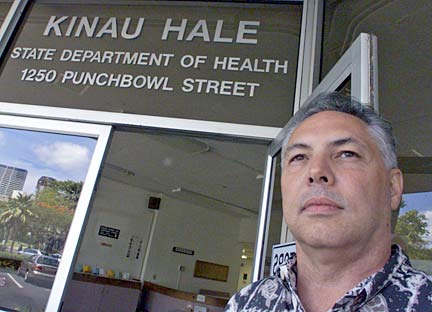
|
Director helped expand
mental health services
Dr. Thomas Hester is leaving the
state Adult Mental Health Division
One of the first things Dr. Thomas Hester did when he came to Hawaii in 2001 as the Adult Mental Health Division's clinical medical director was to meet with mental health consumers.
The biggest problem, they told him, was they couldn't get any public mental health services, he said. They reported being turned away from community mental health centers because there wasn't enough room, they didn't meet the right criteria or they had a problem with substance abuse.
"They were told to go and get themselves cleaned up before they can come back for mental health services," Hester said.
The only way they could get services, they told him, was to be arrested and ordered by the court to the Hawaii State Hospital. Then upon discharge, they could get community services, he said.
The picture has changed dramatically under Hester's leadership. More than 9,000 people are receiving services compared with fewer than 4,500 when he arrived, Hester said in an interview yesterday.
A state access line gets more than 80,000 calls annually, he said. The access center was initiated as part of the community mental health plan to track those requesting services and assure they get a timely assessment and crisis services if needed.
Hester resigned Friday as division chief after learning he was being excluded from completion of the community plan, required under a consent decree with the U.S. Justice Department.
"I have left my heart in other places, but I have never felt the pain that I felt on Friday when I had to look people in the eye, my staff who were in tears and consumers who were in tears, and say I have to leave because I'm not at the table," he said.
Hester said he is pleased with changes during his tenure to make sure people with mental illness receive services they need and participate in the system.
Hester said he committed to making it a "recovery-based system" involving consumers in every level of planning and policy-making, "and that has happened."
Most important, he said, is to ensure that treatment teams honor patients' desires and build on their strengths so they can recover and become contributing citizens.
"We have also taken steps to honor and celebrate achievements of people with mental illness rather than focus on their deficits and disabilities."
Hester helped write a remedial plan leading to removal of federal oversight from the Hawaii State Hospital and assisted in design of the court-ordered community plan, implementing 74 of 88 action items.
He learned last week that he would not have any involvement or authority in planning and overseeing implementation of the final 14 actions, many of which are under way, he said.
Court, Justice Department and Health Department officials involved with the consent decree met here through June 9, and an attorney briefed him June 14 on the change of direction, Hester said.
"I thought very carefully because I have never been at a place where I have put in more of my heart and my soul and my brains in trying to improve services, and we have had, I believe, a tremendous amount of success," he said.
"The finish line is only a year away, and I couldn't accept not having the same relationship I had through successful completion of the hospital portion and 74 of the 88 actions that needed to be delivered in the community plan."
Kris McLoughlin, the court-appointed monitor for the consent decree, declined to comment about the change.
Hester has brought millions of federal dollars into the state for adult mental health projects and services because he was concerned that "if just state dollars were used, when the court left and pressure was off, money would go away," he said.
"My concerns really don't relate just to the next year of compliance, but having the state create a sustaining system that doesn't relax when the court leaves, that will continue to grow and develop, that's healthy because it respects consumers, understands modern services and can rely on well-trained professional work forces and a more steady stream of funding that isn't just coming from state coffers."
www.state.hi.us/health/
E-mail to City Desk
[News] [Business] [Features] [Sports] [Editorial] [Do It Electric!]
[Classified Ads] [Search] [Subscribe] [Info] [Letter to Editor]
[Feedback]
